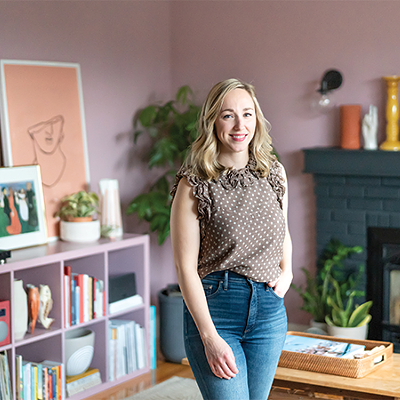Sarah Metherall and Graham Caswell bought their first house in March 2014. The old home in Old Dartmouth fell within their budget, but was way bigger than they needed—and conveniently zoned R2 for rental property—so they opted to turn the basement into an income property. With no experience with renovations, the couple “took a leap of faith” and dove in immediately, starting construction on the apartment before they’d even unpacked their boxes. “It wasn’t long ago we thought there was no way we’d ever be able to afford a house, but having a rental property income really makes it feasible. People have so many debts, and the job market it difficult, this is a nice comfort and security,” says Metherall. “I see it as an income generator to sink back into our house.” Here are their tips for fellow first-timers.
1. Ask the experts
“Bring someone in who does it for a living to get an idea of what the space is capable of and what you need to do to make it capable of putting a unit in,” says Caswell. In efforts to save money, they opted to not hire a general contractor, but say in hindsight they wish they had help managing the process. “It’s not worth the savings to do it yourself unless you’re truly handy,” says Metherall. “Which we’re not.”
2. Ask everyone
Don’t take a single piece of advice for granted—it’ll all teach you something. “Talk to people. Everyone has parents or friends or uncles or aunts—anyone that’s more experienced than you, who’ve gone through it and made the mistakes,” says Caswell. “Learn from their mistakes rather than your own.”
3. Get multiple quotes for everything
“We were in a panic and didn’t always get multiple quotes for the work we did,” says Metherall of a mistake they made. “There’s definitely people we used that we wouldn’t use again, but on the other side of that we found some awesome people too.”
4. Don’t be afraid to be curious
You’ll feel worse not asking questions than asking ones that feels dumb, or obvious. “I didn’t feel I had the knowledge of the industry to question what was happening or to ask, ‘What does this mean?’ says Metherall. “You need to empower yourself with the knowledge to make sure it’s done right.”
5. Anticipate problems
Being prepared for hiccups can help you insure you won’t be bogged down by what you can’t control. “Sometimes you’re going to rip down a wall and find terrible electric that someone who lived there 20 years ago did on their own and it’s dangerous and you have to rewire everything, and you just have to go with it,” says Caswell.
6. Take your time finding a tenant
“We were rushing because we needed that extra income, and we really wanted to fill the space,” says Caswell. But they still took their time, and listened to their collective gut. “Don’t go with the first person who’s interested. You’ll know when someone feels right for your space.”













